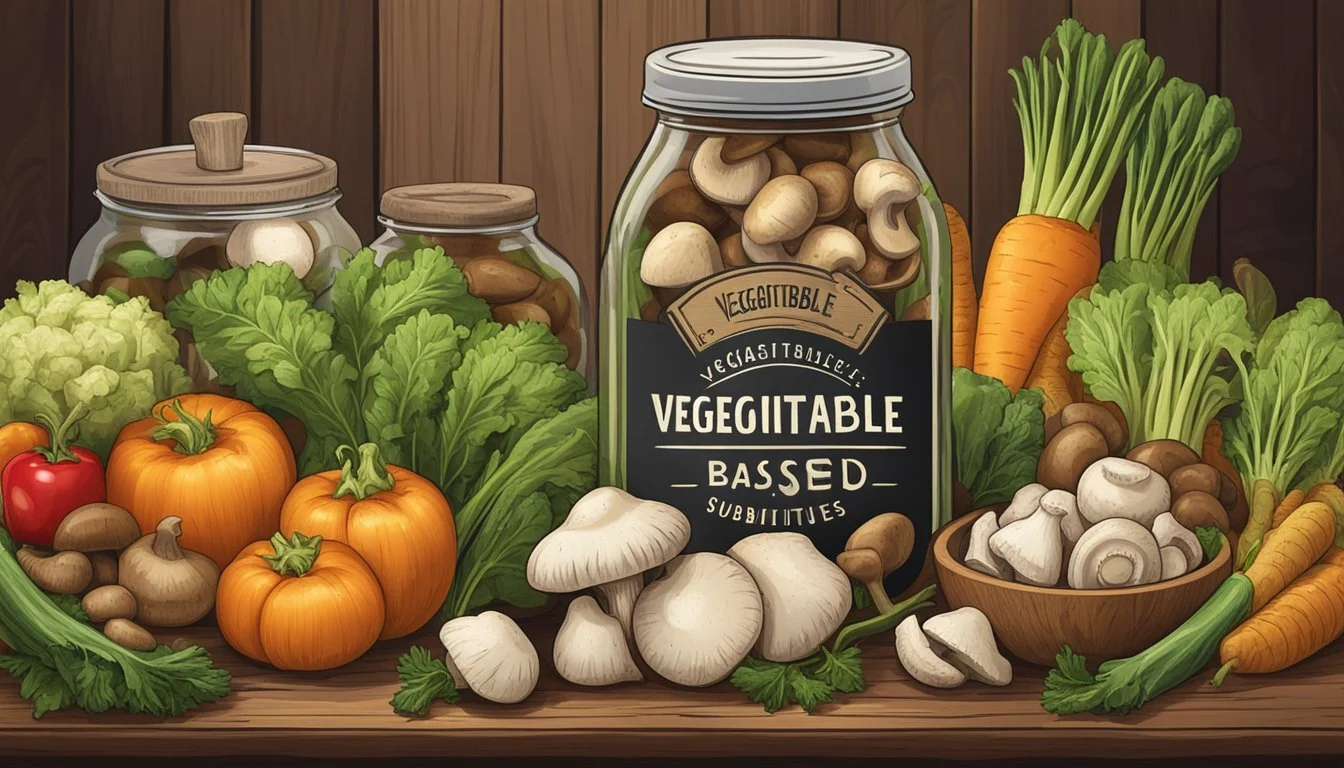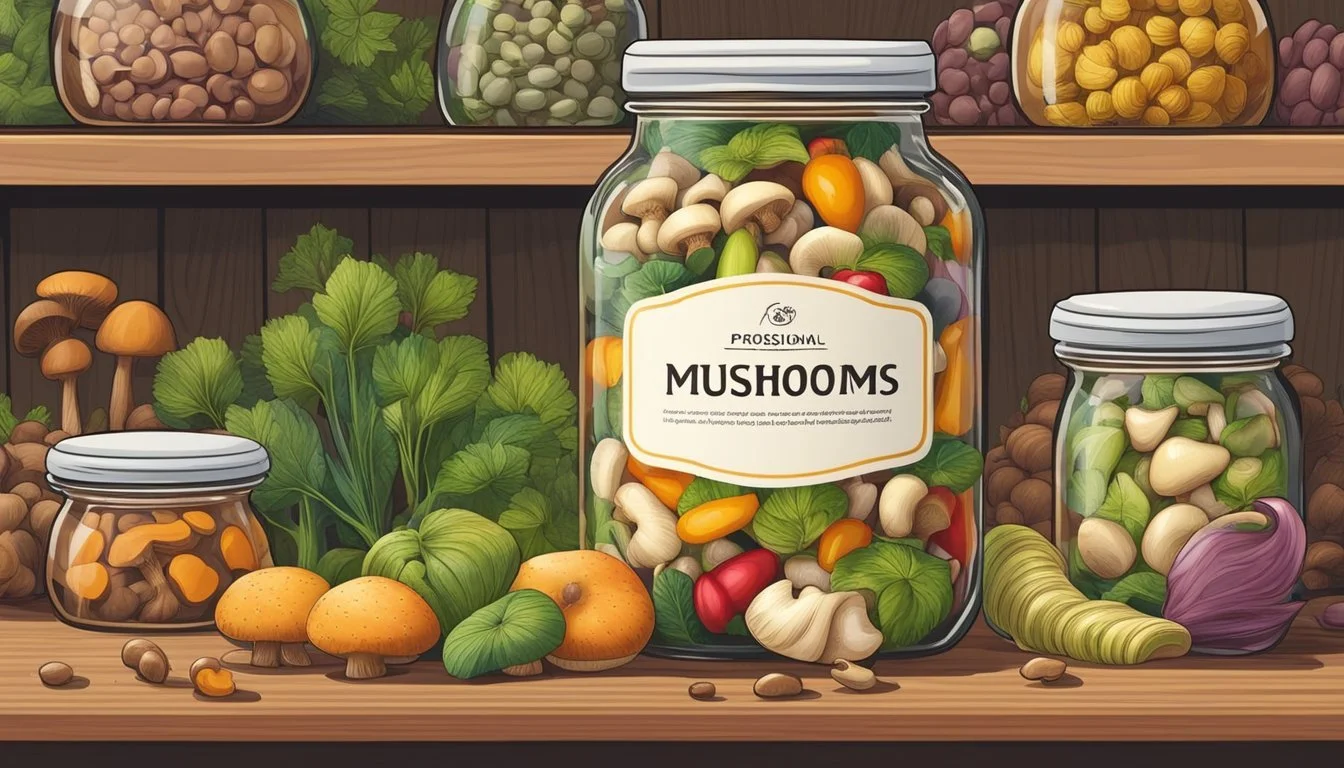Pickled Mushrooms Substitutes
Best Alternatives for Recipes
Cooking with mushrooms adds a distinct, earthy flavor to dishes, but what if you need a substitute for pickled mushrooms? Fear not—many ingredients can replicate the unique taste and texture of pickled mushrooms in your recipes. While fresh and canned mushrooms are common replacements, other options like artichoke hearts and olives can also work wonders.
If you're crafting a recipe and find yourself out of pickled mushrooms, consider using capers for their similar briny flavor. Additionally, marinated artichoke hearts offer a tender, slightly tangy alternative that can blend seamlessly into your cooking. Olives, particularly green ones, also provide a satisfyingly salty bite.
For those who enjoy a hint of umami, tofu infused with a bit of vinegar and spices can mimic the taste profile of pickled mushrooms. With these substitutes, you can ensure your dishes retain the complexity and depth that pickled mushrooms typically bring.
Understanding Mushroom Substitutes
Pickled mushrooms offer a unique combination of earthy and umami flavors infused with the tanginess of brine and fermentation. Selecting the right substitute involves matching these key characteristics to maintain the integrity of the dish.
Characteristics of Pickled Mushrooms
Pickled mushrooms are typically small and firm with a slightly chewy texture. Their earthy flavor is enhanced by the pickling process, which adds tangy and savory notes, making them rich in umami. The fermentation process also contributes to their unique taste profile, adding a hint of sourness that complements the natural flavors of the mushrooms.
Criteria for Choosing a Substitute
When choosing substitutes, consider both texture and flavor. Look for ingredients that can mimic the firmness and slight chewiness of pickled mushrooms. Some ideal options include:
Zucchini: When pickled, it retains a similar texture and absorbs flavors well.
Tofu: Firm tofu, when pickled, can emulate the texture and mild flavor profile.
Chickpeas: These legumes offer a different texture but can absorb the pickling spices effectively.
Balancing these criteria ensures that the substitute complements the dish without overpowering or deviating too much from the original flavor profile.
Vegetable-Based Substitutes
When seeking alternatives to pickled mushrooms, several vegetable-based substitutes are available that can provide unique flavors and textures. Below, different options such as zucchini, eggplant, potatoes, squash, olives, and others are explored to enhance different dishes.
Zucchini and Eggplant
Zucchini is a popular substitute due to its mild flavor and spongy texture, which allow it to soak up flavors from marinades and sauces. This makes it versatile in stir-fries, casseroles, and stews, offering a low-calorie and gluten-free option for vegetarians.
Eggplant has a meaty texture and can be grilled or baked to add depth to dishes. It's particularly good in Mediterranean recipes and can mimic the earthy qualities of mushrooms when cooked properly. Both vegetables work well when sliced thin and pickled, retaining their structure and flavor.
Potatoes: From Russet to Sweet
Potatoes provide substantial bulk to dishes and have a neutral flavor that pairs well with various seasonings. Russet potatoes are excellent for boiling and mashing, absorbing pickling brine effectively to create a soft yet firm texture.
Sweet potatoes offer a sweet flavor and can be roasted or baked before pickling to enhance their natural sweetness. Their vivid color and nutrient density make them a visually appealing and healthy addition to pickled vegetable assortments.
Squash Varieties
Squash, such as butternut or acorn squash, brings a slightly sweet and earthy flavor to dishes. These varieties can be roasted, grilled, or sautéed before pickling, allowing them to absorb brine while maintaining their firm texture.
Squash is ideal for adding a hearty component to soups, stews, and salads. When pickled, it retains its vibrant color, adding a visually pleasing element to meals.
Olives and Artichoke Hearts
Olives are already a staple in pickling and can easily replace mushrooms due to their briny and robust flavor. They add a salty punch to antipasto platters, pizzas, and salads. Varieties like Kalamata or green olives can be used depending on the desired flavor profile.
Artichoke hearts offer a tender yet fibrous texture, making them suitable for robust dishes like stews and pasta. They are often pre-pickled or marinated and can be added directly to recipes, enhancing the dish's complexity.
Sun-Dried Tomatoes
Sun-dried tomatoes provide a concentrated sweet and tangy flavor that can mimic the umami taste of mushrooms. These tomatoes work well in pasta dishes, salads, and as pizza toppings.
Rehydrating them in olive oil or a brine before use can soften their texture while maintaining their intense flavor. Sun-dried tomatoes are an excellent choice for Mediterranean and vegetarian dishes.
Caramelized Onions and Leeks
Caramelized onions have a sweet, rich flavor achieved through slow cooking. When added to pickling brine, their flavor intensifies, making them a good substitute for pickled mushrooms in sandwiches, burgers, and salads.
Leeks offer a milder alternative to onions and become sweet when caramelized. Their layered texture allows them to absorb flavors deeply, making them suitable for various dishes. Pickled leeks can be an excellent addition to gourmet recipes, adding a sophisticated touch.
Using these vegetable-based substitutes provides a range of flavors and textures, accommodating different dietary preferences and enhancing the culinary experience.
Legume-Based Substitutes
Legume-based substitutes offer excellent alternatives to pickled mushrooms by providing both texture and nutritional benefits. Different options like tofu, chickpeas, lentils, and soybeans can be easily integrated into various recipes.
Tofu: A Versatile Option
Tofu, made from soy milk, is a popular substitute for mushrooms due to its ability to absorb flavors. It has a firm texture, making it suitable for pickling. Whether used in stir-fries, soups, or salads, tofu can mimic the meaty texture of mushrooms.
Cooking tip: Marinate tofu in your favorite seasoning before pickling to enhance its flavor. Additionally, pressing tofu before cooking removes excess moisture, improving its ability to soak up flavors.
Chickpeas and Lentils
Chickpeas, also known as garbanzo beans, and lentils are rich in protein and fiber, making them hearty substitutes. These legumes can be pickled whole or crushed to create varied textures in dishes.
Nutritional perk: High in protein and fiber, chickpeas and lentils contribute significantly to a balanced diet. They work well in Mediterranean and Middle Eastern dishes, adding nutritional value and diverse flavors.
Soybeans and Fermented Soy Products
Soybeans in various forms, such as tempeh and miso paste, offer unique flavors and textures. Tempeh, a fermented soybean product, provides a nutty taste and chewy texture, making it a robust substitute for mushrooms.
Fermentation benefits: Fermented soy products like tempeh and miso are rich in probiotics, promoting gut health. Additionally, these products add a depth of flavor that complements many Asian dishes.
In summary, legume-based substitutes such as tofu, chickpeas, lentils, and soybeans offer versatile and nutritious alternatives to pickled mushrooms. Their ability to absorb flavors and provide essential nutrients makes them excellent additions to various culinary applications.
Nut and Seed Substitutes
Nut and seed substitutes can provide a similar texture and nutritional profile to pickled mushrooms. They offer unique flavors and benefits that mimic those of mushrooms.
Using Seeds to Mimic Mushrooms
Seeds such as sunflower seeds, pumpkin seeds, and hemp seeds can serve as excellent replacements for pickled mushrooms. These seeds can replicate the meaty texture and nutty flavor associated with mushrooms.
For example, sunflower seeds, when roasted, give a delightful crunch and subtle sweetness. Pumpkin seeds, on the other hand, offer a mildly earthy taste and tender texture. Hemp seeds, known for their high protein content, can be sprinkled into dishes to add richness.
To prepare:
Roast the seeds for added flavor.
Soak in brine for a pickled effect.
Add to salads, stir-fries, or casseroles.
The versatility of seeds provides ample opportunities to experiment, making them a practical substitute for mushrooms in many recipes.
Nuts as Hearty Replacements
Nuts like walnuts, almonds, and cashews can act as hearty substitutes for pickled mushrooms. Walnuts, with their robust and slightly bitter flavor, offer a meaty texture akin to that of cooked mushrooms.
Almonds provide a crunchy texture and are rich in proteins and healthy fats, making them an excellent addition to various dishes. Cashews, when soaked and cooked, have a creamy texture that can mimic the softness of mushrooms.
Usage tips:
Chop the nuts to desired size.
Roast or soak them for different textures.
Incorporate into stews, pasta, or sautés.
These nuts can enrich your dishes with their unique flavors while maintaining the desired texture and nutritional benefits similar to pickled mushrooms.
Other Mushrooms as Substitutes
Different types of mushrooms can be excellent substitutes for pickled mushrooms, each offering unique flavors and textures. Portobello, cremini, shiitake, oyster, porcini, and morel mushrooms are versatile options that can enhance various dishes.
Portobello and Cremini
Portobello and cremini mushrooms are closely related, with portobellos being the mature version of creminis. Both offer a meaty texture, making them great for dishes where a hearty bite is desired.
Portobellos are large and can be sliced to mimic the size of pickled mushrooms, ideal for grilling, stuffing, or as a meat substitute. Creminis, also known as baby bellas, have a slightly firmer texture and robust flavor. They work well in soups, casseroles, and pasta dishes, providing an earthy taste.
Shiitake and Oyster
Shiitake and oyster mushrooms are known for their distinct flavors and textures. Shiitakes have a rich, smoky taste and chewy texture, making them suitable for stir-fries, sautés, and broths.
Oyster mushrooms are delicate with a mild, slightly sweet flavor. They are versatile and cook quickly, making them perfect for quick-cooking methods such as stir-frying and steaming. Both types can absorb marinades well, which makes them good stand-ins for pickled mushrooms in many recipes.
Porcini and Morel
Porcini and morel mushrooms are prized for their intense flavors. Porcini mushrooms have a deep, nutty flavor that can enhance risottos, soups, and sauces. They often come dried, which concentrates their flavor.
Morel mushrooms are highly sought after for their unique appearance and earthy, umami taste. Their honeycomb-like structure makes them excellent at absorbing flavors, making them a great addition to rich sauces and gourmet recipes. They can be sautéed or added to complex dishes where their robust flavor can shine.
Storing and Using Dried Mushrooms
Dried mushrooms such as porcini, shiitake, or morel are convenient substitutes for pickled mushrooms. They have a long shelf life and can be rehydrated quickly by soaking in warm water, which also produces a flavorful broth that can be used in cooking.
When using dried mushrooms, it is important to rinse them thoroughly after rehydration to remove any grit. They can then be chopped and used in sauces, soups, and stews. The rehydration liquid, rich in mushroom essence, can be added to dishes for extra depth of flavor.
By understanding the unique qualities of these edible mushrooms, one can easily find suitable replacements for pickled mushrooms in various mushroom recipes.
Incorporating Mushroom Substitutes into Dishes
Incorporating mushroom substitutes into dishes can enhance texture and flavor while maintaining the richness that mushrooms add. Here, various substitutes are adapted to fit into comfort foods, salads, main courses, and appetizers.
Comfort Foods: Stews and Casseroles
In stews and casseroles, eggplant and zucchini work well as mushroom substitutes due to their ability to absorb flavors and retain a soft, fleshy texture. Tofu can also be included, providing a rich protein source that mimics the meaty essence of mushrooms.
Recipes like beef stew or vegetable casseroles benefit from these substitutes. Cauliflower is another great choice, adding bulk and a mild flavor suitable for various stews. By using these substitutes, dishes maintain their hearty appeal without losing depth.
Elevating Salads and Soups
In soups and salads, artichoke hearts and bamboo shoots offer a unique blend of texture and flavor. Artichoke hearts provide a tender, slightly tangy taste, perfect for adding complexity to green salads.
Bamboo shoots, with their satisfying crunch, are excellent in hot and sour soup or Asian-inspired salads. Tempeh can also be used, especially in salads, where its nutty flavor complements dressings. These substitutes ensure that salads and soups remain fresh, vibrant, and nutritious.
Creating Flavorful Main Courses
For main courses, Portobello mushrooms can substitute traditional mushrooms in dishes like stroganoff or risotto. Their large size and robust flavor add depth to these recipes. Cauliflower, when finely chopped, integrates well into pasta dishes, providing a great texture.
Sides and Appetizers
In sides and appetizers, tofu and eggplant excel due to their versatile nature. Grilled eggplant slices make excellent toppings for sandwiches and pizza. Tofu can be marinated and baked to create flavorful bites.
In fried appetizers or dips, zucchini can replace mushrooms to add a mild taste and pleasing consistency. These substitutes ensure that appetizers retain their appeal while catering to various dietary preferences.
These methods ensure that mushroom flavors and textures are well-imitated, enhancing various dishes without sacrificing taste or satisfaction.
Nutritional Considerations
Pickled mushroom substitutes offer various nutritional benefits that make them suitable for different dietary needs. Key points to consider include protein content, essential vitamins and minerals, as well as dietary fiber and antioxidants.
Protein and Amino Acids
Protein is essential for muscle repair and overall bodily function. Substitutes like tofu and tempeh are rich in protein, making them ideal for vegetarians and vegans.
These options not only provide a similar texture to mushrooms but also boast a complete amino acid profile. Chickpeas and lentils, although not complete proteins, can be combined with grains to improve their amino acid composition. Soy milk can also be a helpful substitute in recipes requiring a creamy texture, adding additional protein content.
Vitamins and Minerals
Mushroom substitutes such as bamboo shoots and tofu are rich in vitamins and minerals. Bamboo shoots are a good source of potassium and manganese, essential for maintaining electrolyte balance and bone health.
Tofu and tempeh contain iron and calcium, vital for blood health and bone strength. Chickpeas provide a good amount of iron, magnesium, and folate, which are beneficial for energy production and neural health. These substitutes ensure you don't miss out on essential minerals and vitamins.
Dietary Fiber and Antioxidants
Dietary fiber is crucial for digestive health, and substitutes like lentils and chickpeas are excellent sources. Fiber aids in regulating blood sugar levels and enhancing bowel movements.
Antioxidants are another important consideration. Tofu and tempeh contain isoflavones, which have antioxidant properties that may help reduce inflammation and oxidative stress. Bamboo shoots also come with mild onion flavor, adding a bit of zest while delivering antioxidants and fiber. Including these substitutes in your diet can enrich it with both fiber and antioxidants, contributing to overall well-being.
Adapting to Dietary Restrictions
Addressing dietary restrictions can ensure that everyone at the table can enjoy delicious pickled mushroom substitutes.
Allergies and Mushroom Intolerances
Mushroom allergies, though relatively uncommon, can cause adverse reactions. Symptoms may include skin rashes, itching, and respiratory issues.
For those with these allergies, chickpeas and cauliflower serve as excellent substitutes. Chickpeas bring a nutty texture, while cauliflower offers a mild flavor adaptable to various pickling spices.
Nutrient-rich vegetables like zucchini provide a different texture but still absorb the pickling brine effectively. Always consult with allergists to confirm safe alternatives.
Vegetarian and Vegan Alternatives
Vegetarians and vegans often seek substitutes that replicate the umami and meaty texture of mushrooms. Tofu and tempeh are standout choices due to their ability to absorb flavors and provide substantial texture.
For a purely plant-based approach, eggplant and jackfruit are favored. Eggplant's sponge-like texture is highly absorbent, while jackfruit's fibrous texture mimics meat well.
Mushroom powder, made from dehydrated mushrooms, offers an umami punch for those not allergic but avoiding whole mushrooms. These options ensure diverse and satisfying pickled alternatives.










